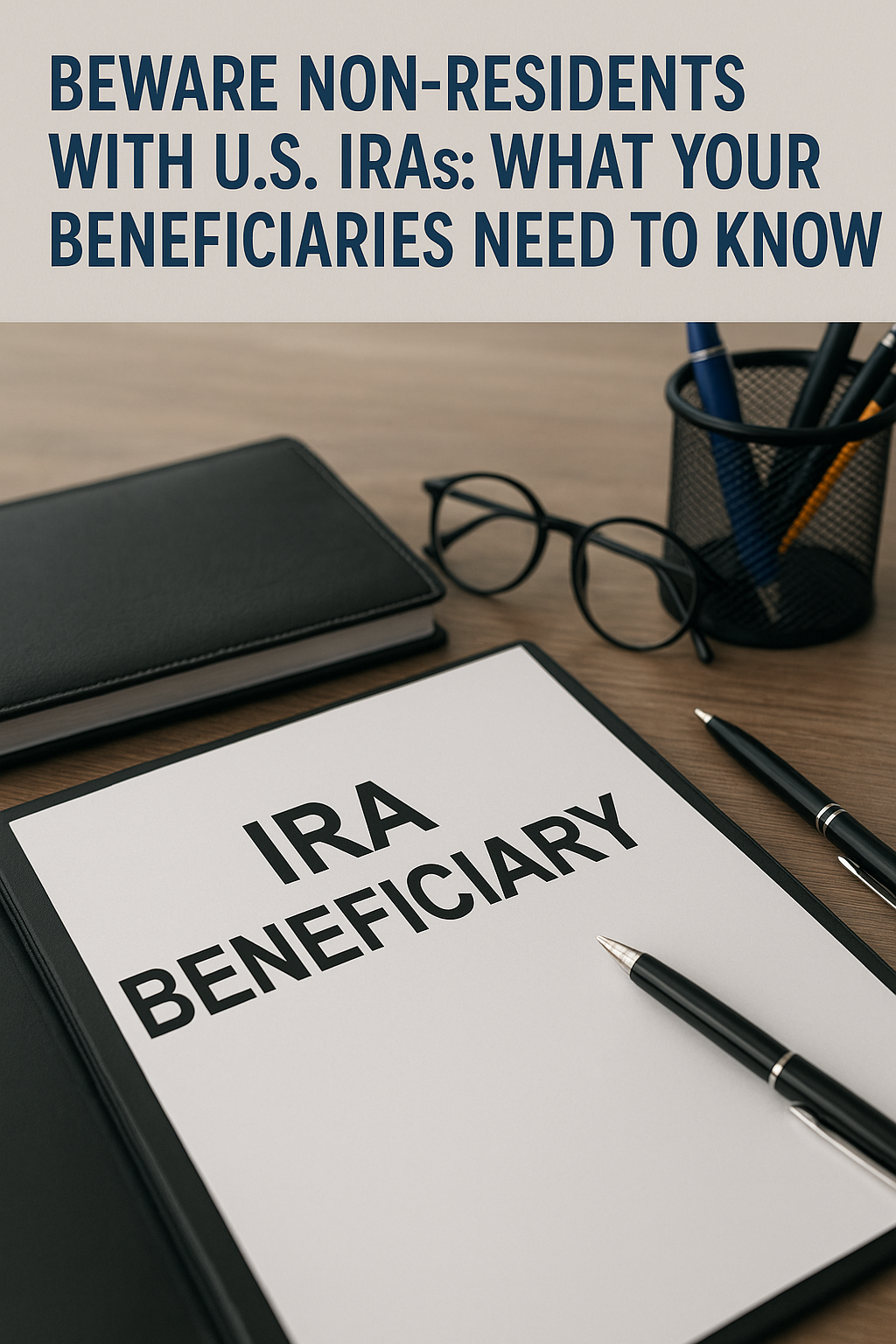 alt="" class="wp-image-949"/>
alt="" class="wp-image-949"/>For Americans thinking about wealth transfer and legacy planning, the federal estate tax exemption is a crucial figure to understand. The Tax Cuts and Jobs Act (TCJA) of 2017 significantly increased the estate tax exemption, allowing individuals to pass on a larger amount of wealth free from federal estate taxes. However, this increase is temporary and is set to expire after 2025, meaning that the estate tax exemption sunset 2025 will occur unless new legislation is passed. This potential reduction has significant implications for estate planning for wealthy individuals and families. U.S. citizens living in Canada must consider the Deemed Disposition Tax and are also subject to U.S. estate taxes on their worldwide assets. In this article, we’ll explore the current estate tax exemption, the anticipated changes if it reverts, and illustrate the impact with a practical example. Current Estate Tax Exemption Under the Tax Cuts and Jobs Act As of 2024, the estate tax exemption is $13.61 million per individual, or $27.22 million for a married couple. This exemption is indexed for inflation, meaning that it adjusts each year to reflect changes in purchasing power. With the 2025 gift limit and the potential changes in the estate tax, individuals must prepare for the sunset of the TCJA. Any assets above this threshold are subject to estate tax rates that range from 18% to 40%, depending on the size of the estate.
Key Benefits of the Increased Exemption:
• Tax-Free Wealth Transfer: Individuals can transfer up to $13.61 million without paying estate tax, which means that a married couple can transfer up to $27.22 million.
• Enhanced Lifetime Giving: The increased exemption also applies to lifetime gifts, allowing individuals to reduce the size of their taxable estate by gifting assets to heirs during their lifetime. Gifts made to any individual that are above the annual gift exemption amount of $18,000 in 2024 will proportionately reduce the gift giver’s lifetime estate tax exemption amount. With the 2025 estate tax sunset approaching, now is an opportune time for individuals to assess their wealth transfer strategies.
Reversion to Pre-TCJA Levels After 2025 If no legislative action is taken, the estate tax exemption is scheduled to revert to pre-TCJA levels on January 1, 2026. Under the pre-TCJA rules, the exemption was roughly $5.49 million per individual (adjusted for inflation). When adjusted to 2026, estimates suggest that the exemption could revert to around $6-7 million per individual, or $12-14 million per married couple.
Implications of a Lower Exemption:
• Reduced Tax-Free Transfers: With a lower exemption, many families who were previously exempt from estate tax could face significant tax liabilities.
• Estate Planning Adjustments: Individuals with estates between the current and projected future exemptions may need to revisit their estate plans to minimize the impact of the tax.
• Accelerated Gifting: Some families may choose to take advantage of the current high exemption by making lifetime gifts before 2026, locking in the exemption before it decreases.
Example: Potential Impact on a High-Net-Worth Estate
Let’s consider a hypothetical estate and compare how it would be taxed under the current exemption versus if it reverts to the pre-TCJA level.
Scenario:
• Estate Value: $16 million
• Marital Status: Single individual (for simplicity)
Calculation with Current Exemption
• Exemption (2023): $13.61 million
• Taxable Amount: $16 million – $13.61 million = $2.39 million
• Estate Tax: $2.39 million × 40% = $956,000
Under the current exemption, this individual’s estate would owe $956,000 in estate taxes on the $16 million estate, as only the portion above the exemption is taxed. Calculation if Exemption Reverts to Pre-TCJA Levels
• Exemption (Estimated Post-2025): $6 million
• Taxable Amount: $16 million – $6 million = $10 million
• Estate Tax: $10 million × 40% = $4 million
If the estate tax exemption reverts to approximately $6 million, this same estate would owe $4 million in estate taxes, which is a significantly higher tax bill compared to the current exemption.
Summary of Impact:
• Estate Tax with Current Exemption: $956,000
• Estate Tax if Exemption Reverts: $4 million
• Difference: $3.044 million in additional estate taxes if the exemption reverts
This example highlights the potential tax liability increase for high-net-worth individuals if the estate tax exemption reverts to pre-TCJA levels. A difference of $3.044 million could significantly impact the amount of wealth transferred to heirs and underscores the importance of proactive estate planning.
Strategies to Prepare for a Possible Lower Exemption
Given the potential reversion, individuals may want to consider strategies to mitigate estate tax implications, including:
1. Lifetime Gifting: By making use of the current high exemption, individuals can reduce the size of their taxable estate through lifetime gifts.
2. Charitable Giving: Charitable giving can be used to reduce your taxable estate both during your lifetime and upon death.
3. Irrevocable Trusts: Transferring assets into irrevocable trusts can remove them from the estate, potentially lowering future estate tax exposure.
4. Grantor Retained Annuity Trusts (GRATs): GRATs allow individuals to transfer future
appreciation of assets out of the estate at a discounted gift tax cost, which can be especially beneficial if the exemption decreases.
5. Spousal Portability: Married couples can take advantage of portability, where the unused portion of the estate exemption of the first spouse to die can be transferred to the surviving spouse, effectively doubling the exemption amount.

While the current estate tax exemption offers a unique opportunity for individuals to transfer wealth tax-efficiently, the potential reversion to pre-TCJA levels in 2026 presents a challenge. For those with estates likely to exceed the lower threshold, now is the time to explore proactive strategies to minimize future estate tax liability with the knowledge of changes in the estate tax. Consulting with a tax advisor or estate planning specialist can help ensure that you make the most of today’s exemption levels and are prepared for any potential changes. You should not do anything until we have more clarity on what the future estate tax regime may be. By staying up to date on changes that are happening, you can better protect your assets and maximize the wealth passed onto future generations.
Contact Us to discuss your unique situation. Crossing the 49th Parallel can be very complex and is best undertaken with the assistance of a professional. From the Desert to the, we are your cross-border retirement experts!
 class="attachment-post-thumbnail size-post-thumbnail wp-post-image" alt="What Happens to Canadian Registered Accounts When You Die as a Non-Resident" style="width:100%;height:100%;object-fit:cover;" srcset="https://49thparallelwealthmanagement.com/wp-content/uploads/2025/06/non-resident-death.png 1536w, https://49thparallelwealthmanagement.com/wp-content/uploads/2025/06/non-resident-death-300x200.png 300w, https://49thparallelwealthmanagement.com/wp-content/uploads/2025/06/non-resident-death-1024x683.png 1024w, https://49thparallelwealthmanagement.com/wp-content/uploads/2025/06/non-resident-death-768x512.png 768w, https://49thparallelwealthmanagement.com/wp-content/uploads/2025/06/non-resident-death-600x400.png 600w" sizes="(max-width: 1536px) 100vw, 1536px" />
class="attachment-post-thumbnail size-post-thumbnail wp-post-image" alt="What Happens to Canadian Registered Accounts When You Die as a Non-Resident" style="width:100%;height:100%;object-fit:cover;" srcset="https://49thparallelwealthmanagement.com/wp-content/uploads/2025/06/non-resident-death.png 1536w, https://49thparallelwealthmanagement.com/wp-content/uploads/2025/06/non-resident-death-300x200.png 300w, https://49thparallelwealthmanagement.com/wp-content/uploads/2025/06/non-resident-death-1024x683.png 1024w, https://49thparallelwealthmanagement.com/wp-content/uploads/2025/06/non-resident-death-768x512.png 768w, https://49thparallelwealthmanagement.com/wp-content/uploads/2025/06/non-resident-death-600x400.png 600w" sizes="(max-width: 1536px) 100vw, 1536px" />What Happens to Canadian Registered Accounts When You Die as a Non-Resident
 class="attachment-post-thumbnail size-post-thumbnail wp-post-image" alt="New Bill Offers Medicare Relief for Cross-Border Retirees" style="width:100%;height:100%;object-fit:cover;" srcset="https://49thparallelwealthmanagement.com/wp-content/uploads/2025/06/20250605_0722_Concerned-Couple-at-Hospital_simple_compose_01jx07f099fjw91e52w0g2sab3.png 1024w, https://49thparallelwealthmanagement.com/wp-content/uploads/2025/06/20250605_0722_Concerned-Couple-at-Hospital_simple_compose_01jx07f099fjw91e52w0g2sab3-200x300.png 200w, https://49thparallelwealthmanagement.com/wp-content/uploads/2025/06/20250605_0722_Concerned-Couple-at-Hospital_simple_compose_01jx07f099fjw91e52w0g2sab3-683x1024.png 683w, https://49thparallelwealthmanagement.com/wp-content/uploads/2025/06/20250605_0722_Concerned-Couple-at-Hospital_simple_compose_01jx07f099fjw91e52w0g2sab3-768x1152.png 768w, https://49thparallelwealthmanagement.com/wp-content/uploads/2025/06/20250605_0722_Concerned-Couple-at-Hospital_simple_compose_01jx07f099fjw91e52w0g2sab3-600x900.png 600w" sizes="(max-width: 1024px) 100vw, 1024px" />
class="attachment-post-thumbnail size-post-thumbnail wp-post-image" alt="New Bill Offers Medicare Relief for Cross-Border Retirees" style="width:100%;height:100%;object-fit:cover;" srcset="https://49thparallelwealthmanagement.com/wp-content/uploads/2025/06/20250605_0722_Concerned-Couple-at-Hospital_simple_compose_01jx07f099fjw91e52w0g2sab3.png 1024w, https://49thparallelwealthmanagement.com/wp-content/uploads/2025/06/20250605_0722_Concerned-Couple-at-Hospital_simple_compose_01jx07f099fjw91e52w0g2sab3-200x300.png 200w, https://49thparallelwealthmanagement.com/wp-content/uploads/2025/06/20250605_0722_Concerned-Couple-at-Hospital_simple_compose_01jx07f099fjw91e52w0g2sab3-683x1024.png 683w, https://49thparallelwealthmanagement.com/wp-content/uploads/2025/06/20250605_0722_Concerned-Couple-at-Hospital_simple_compose_01jx07f099fjw91e52w0g2sab3-768x1152.png 768w, https://49thparallelwealthmanagement.com/wp-content/uploads/2025/06/20250605_0722_Concerned-Couple-at-Hospital_simple_compose_01jx07f099fjw91e52w0g2sab3-600x900.png 600w" sizes="(max-width: 1024px) 100vw, 1024px" />New Bill Offers Medicare Relief for Cross-Border Retirees
 class="attachment-post-thumbnail size-post-thumbnail wp-post-image" alt="Beware: Non-Residents with U.S. IRAs – What Your Beneficiaries Need to Know" style="width:100%;height:100%;object-fit:cover;" srcset="https://49thparallelwealthmanagement.com/wp-content/uploads/2025/06/Ira-Beneficiuary.png 1024w, https://49thparallelwealthmanagement.com/wp-content/uploads/2025/06/Ira-Beneficiuary-200x300.png 200w, https://49thparallelwealthmanagement.com/wp-content/uploads/2025/06/Ira-Beneficiuary-683x1024.png 683w" sizes="(max-width: 1024px) 100vw, 1024px" />
class="attachment-post-thumbnail size-post-thumbnail wp-post-image" alt="Beware: Non-Residents with U.S. IRAs – What Your Beneficiaries Need to Know" style="width:100%;height:100%;object-fit:cover;" srcset="https://49thparallelwealthmanagement.com/wp-content/uploads/2025/06/Ira-Beneficiuary.png 1024w, https://49thparallelwealthmanagement.com/wp-content/uploads/2025/06/Ira-Beneficiuary-200x300.png 200w, https://49thparallelwealthmanagement.com/wp-content/uploads/2025/06/Ira-Beneficiuary-683x1024.png 683w" sizes="(max-width: 1024px) 100vw, 1024px" />Beware: Non-Residents with U.S. IRAs – What Your Beneficiaries Need to Know



